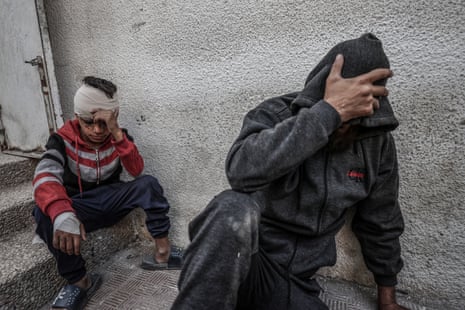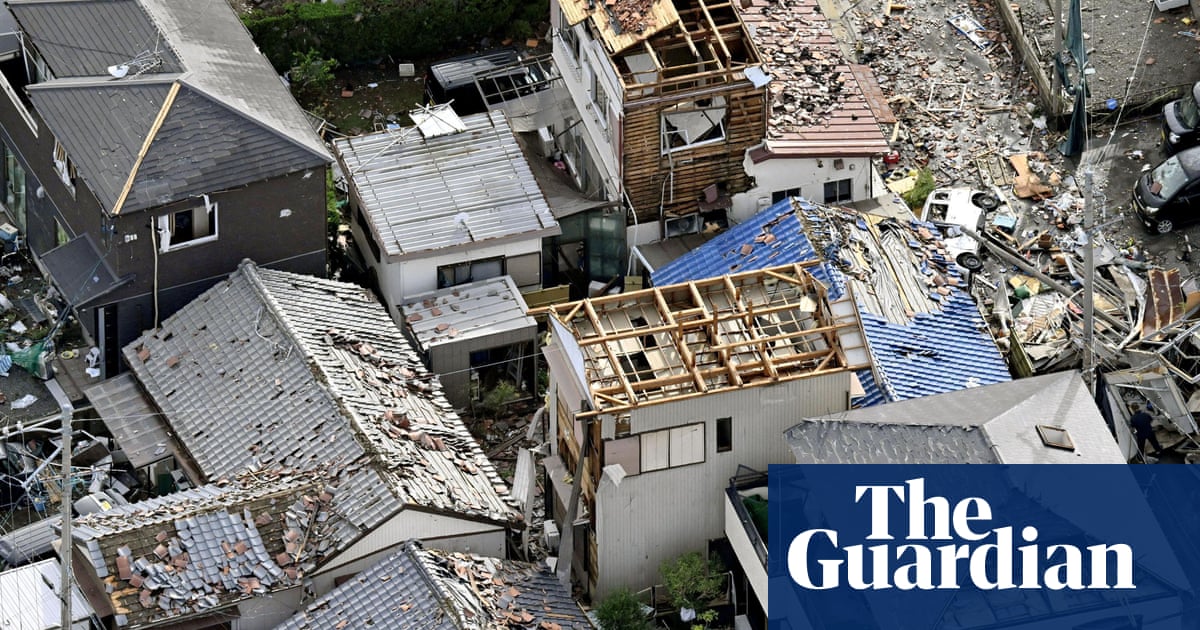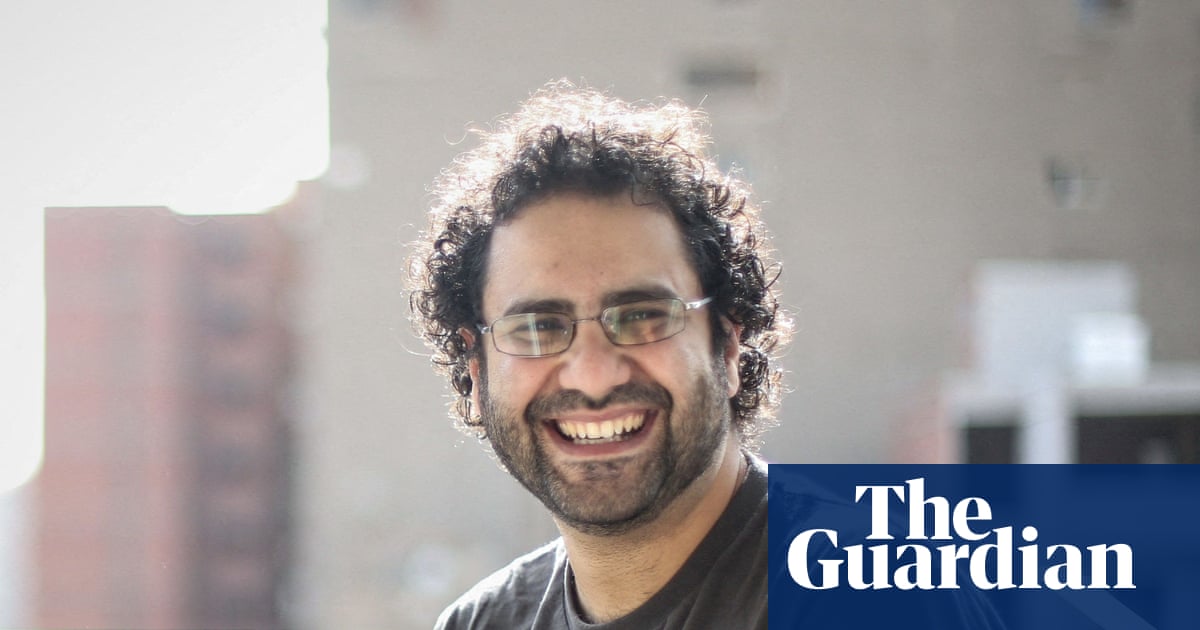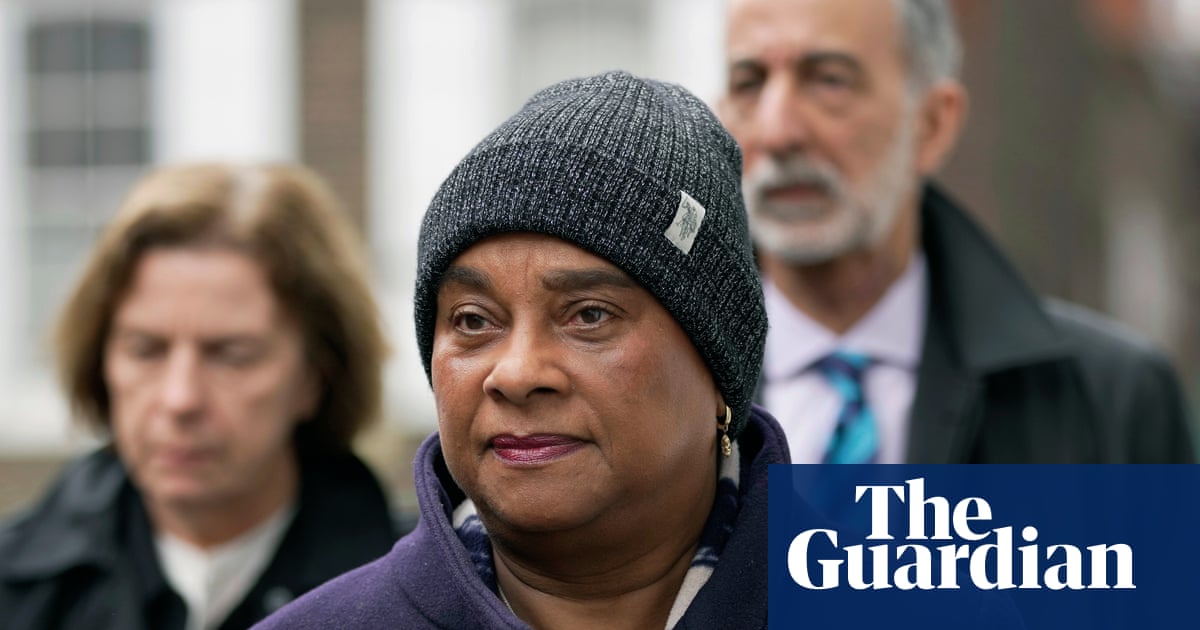
Palestinians mourn their loved ones, killed by an Israeli attack on northern Gaza City. Their bodies were brought to al-Shifa hospital. Photograph: Anadolu/Getty Images
Show key events only Please turn on JavaScript to use this feature
Live feed
Opening summary
Good morning and welcome to our live coverage of Israel’s war on Gaza.
Hamas has said a new Israeli-backed US ceasefire plan would not put an end to the war or the Israeli blockade of Gaza, although it is studying the proposal “with all national responsibility”.
Bassem Naim, a top Hamas official, told the Associated Press that Israel’s response “means perpetuating the occupation and continuing the killing and famine”. He said it “does not respond to any of our people’s demands, foremost among which is stopping the war and famine.”
Another senior Hamas official, Sami Abu Zuhri, told Reuters the terms echoed Israel’s position and did not contain commitments to end the war, withdraw Israeli troops or admit aid as Hamas has demanded.
Earlier the US said Israel has “signed off” on the proposal. Donald Trump and US envoy Steve Witkoff “submitted a ceasefire proposal to Hamas that Israel backed,” the White House said on Thursday, adding that discussions were “ongoing”.
According to a draft leaked to Reuters, the proposal includes a 60-day ceasefire that would be guaranteed by Trump and mediators Qatar and Egypt and an exchange of 28 Israeli hostages – alive and dead – for 125 Palestinian prisoners sentenced to life and the remains of 180 dead Palestinians in the first week.

Aid would be sent to Gaza as soon as Hamas signs off on the agreement according to the draft and Hamas would release the last 30 hostages once a permanent ceasefire is in place, Reuters reported.
According to a draft seen by Israeli newspaper Haaretz, the aid would be distributed by channels including the UN and Red Crescent. Though all Israeli offensive military activities would cease upon the agreement going into force, the army would be redeployed in areas in northern and southern Gaza, as well as the so-called Netzarim Corridor, the paper reported.
In other key developments:
-
The Israel Defense Forces (IDF) issued a new evacuation warning covering a large area of northern Gaza late on Thursday. It calls for Palestinians residing in Al-Atatra, Jabalia, and the Gaza City neighbourhoods of Shujaiya and Al-Zaytun to head west, warning that these areas “will be considered dangerous combat zones” immediately.
-
Israeli forces are carrying out a “forced evacuation” of patients and medical staff inside Al-Awda Hospital in northern Gaza, hospital officials said. Earlier on Thursday, the hospital said there were “still 97 people inside the hospital, including 13 patients and injured individuals, and 84 medical staff members”.
-
An Israeli airstrike on a house in central Gaza killed 22 people, including nine women and children, according to hospital officials. The airstrike hit a family home in Bureij, an urban refugee camp in central Gaza, they said. Israeli strikes in northern Gaza late Wednesday and early Thursday hit a house, killing eight people, including two women and three children, and a car in Gaza City, killing four, local hospitals said.
-
The latest Palestinian death toll from Israeli attacks on Gaza reached 54,249 on Thursday, according to figures by the territory’s health ministry. The majority of those killed are women and children, it says.
-
The UN criticised Israel’s announcement that it will establish 22 new settlements in the occupied West Bank, describing the decision as moving “in the wrong direction”. A UN spokesperson repeated calls by UN chief António Guterres for Israel to “cease all settlement activities in the occupied Palestinian territory.” A UK minister said Britain “condemns these actions”, adding that settlements are “illegal under international law, further imperil the two-state solution, and do not protect Israel.”
-
Italy has offered to treat a Palestinian child who survived an Israeli strike in Gaza in which nine of his siblings were killed. Adam Al-Najjar, 11, is in serious condition in Nasser hospital.
-
A US charity has accused the Gaza Humanitarian Foundation (GHF), the controversial Israeli-backed group that began distributing food in Gaza this week, of sending out photographs of deliveries containing its logo without permission. The aid bearing the Rahma logo, which was prominently displayed in a press packet distributed by GHF, suggested to some media outlets that the groups were official partners.
-
Two people were killed in separate Israeli attacks on south Lebanon on Thursday, the country’s health ministry said, in the latest flare-up despite a ceasefire between Israel and Hezbollah. The ministry said an Israeli strike hit a forested area in Nabatiyeh al-Fawqa, killing one man, while Israeli gunfire on the border town of Kfar Kila killed another.
-
The Israeli army said that it intercepted a missile launched from Yemen on Thursday. The missile interception comes two days after Israeli forces said it intercepted a missile and another projectile fire from Iran-backed Houthi rebels in Yemen.
Key events Show key events only Please turn on JavaScript to use this feature
People can rent a holiday home on Airbnb or Booking.com in an illegal Israeli settlement, on occupied Palestinian territory. But not if you’re a Palestinian.
Josh Toussaint-Strauss and the Guardian’s video team looks into how two of the world’s most popular tourism websites have been doing business on illegally seized land in the occupied West Bank, while Palestinians in the region are facing mass forced displacements and a sharp rise in violent attacks.
Israel is blocking all but a trickle of humanitarian aid from entering Gaza, the United Nations Office for the Coordination of Humanitarian Affairs (OCHA) said, with almost no ready-to-eat food entering what its spokesperson described as “the hungriest place on earth”, Reuters reports.
Spokesperson Jens Laerke said only 600 of 900 aid trucks had been authorised to get to Israel’s border with Gaza, and from there a mixture of bureaucratic and security obstacles made it all but impossible to safely carry aid into the region.
“What we have been able to bring in is flour,” he told a press conference. “That’s not ready to eat, right? It needs to be cooked ... 100% of the population of Gaza is at risk of famine.”
Tommaso della Longa, a spokesperson for the International Committee of the Red Cross and Red Crescent, added that half of its medical facilities in the region were out of action for lack of fuel or medical equipment.
“UNRWA is at a crossroads – without urgent funding, we risk implosion,” UNRWA’s commissioner general Philippe Lazzarini said in an interview with Middle East Eye.
In a post on X, the UN’s aid agency for Palestinian refugees said: “As the largest humanitarian actor supporting millions of #Palestine Refugees, UNRWA faces a severe funding crisis. Urgent financial support is needed for UNRWA to continue supporting the most vulnerable across the region.”
Islamic State has claimed responsibility for two attacks in southern Syria, AP reports.
One of them was an attack on government forces that a war monitor described as the first on the Syrian army to be adopted by the extremists since the fall of Bashar Assad in December.
IS said in statements issued late yesterday that the attacks occurred over the past few days in the al-Safa area in southern Syria. IS once controlled large parts of Syria and Iraq. The militant group is opposed to the new authority in Damascus led by president Ahmad al-Sharaa.
Israel launched hundreds of attacks on Syria following al-Sharaa’s rise to power. It has since dialled them down since Western powers, led by Donald Trump, have embraced the new Syrian leader.
The office of Israeli prime minister Benjamin Netanyahu said the 75-year-old “successfully underwent a routine colonoscopy” at a hospital in Jerusalem, AFP reports.
“Prime minister Benjamin Netanyahu successfully underwent a routine colonoscopy this morning at Shaare Zedek Medical Center in Jerusalem,” a statement from his office said.
Netanyahu has been admitted to hospital several times since returning to office in December 2022, according to information provided by his office.
In July 2023 Netanyahu had a pacemaker implanted after a brief hospitalisation following complaints of dizziness. In March 2024, he underwent hernia surgery before having his prostate removed in December of the same year.
Al Jazeera has reported that its sources at Gaza hospitals said 20 people have been hit by Israeli fire while trying to reach an aid distribution point set up by the US-backed Gaza Humanitarian Foundation.
The distribution site, located near Israel’s Netzarim Corridor bisecting the Palestinian enclave, is the third to have been set up, after two distribution points were established in the southern city of Rafah.
There are no further reports of the incident and the Guardian could not independently verify Al Jazeera’s report, but we will bring you updates as we have them.
The carbon footprint of the first 15 months of Israel’s war on Gaza will be greater than the annual planet-warming emissions of a hundred individual countries, exacerbating the global climate emergency on top of the huge civilian death toll, new research reveals.
A study shared exclusively with the Guardian found the long-term climate cost of destroying, clearing and rebuilding Gaza could top 31m tonnes of carbon dioxide equivalent (tCO2e). This is more than the combined 2023 annual greenhouse gases emitted by Costa Rica and Estonia, yet there is no obligation for states to report military emissions to the UN climate body.
Over 99% of the almost 1.89m tCO2e estimated to have been generated between the 7 October 2023 Hamas attack and the temporary ceasefire in January 2025 is attributed to Israel’s aerial bombardment and ground invasion of Gaza.
Read our full report on the research at the link below:
The UN’s Palestinian aid agency, UNRWA said in a post on X that it has enough supplies to help 200,000 people for a month sitting across the border in Jordan, a three-hour drive from Gaza.
“In the UNRWA warehouse in Amman, just a three-hour drive from #Gaza, we have enough supplies to sustain over 200,000 people for an entire month.
Flour, food parcels, hygiene kits, blankets and medical supplies are ready to be delivered. Gaza needs aid at scale – an unhindered, uninterrupted flow of supplies must be allowed in.”
Gaza has been under Israeli blockade since March. A controversial new US-backed aid distribution organisation that started this week has been marred with reports of chaos and violence. Israeli military officials confirmed they had fired “warning shots” to restore order at a Gaza Humanitarian Foundation aid distribution point. Gaza health officials said at least one civilian had been killed and 48 injured in the incident.
The UK has for months been weighing sanctions against two far-right Israeli ministers, Itamar Ben-Gvir, the national security minister, and Bezalel Smotrich, the finance minister, the New York Times reported last night.
Several officials told the US newspaper that the government had still not decided whether go ahead. The fatal attack earlier this month on two Israeli embassy staff members, Yaron Lischinsky and Sarah Milgrim, by a pro-Palestinian gunman in Washington DC has given pause to some British officials, who question whether this is the right moment to punish senior Israeli leaders, according to one diplomat.
Israel far-right minister says 'time to go in with full force' in Gaza
Israel’s far-right national security minister Itamar Ben Gvir said it was time to use “full force” in Gaza, after Hamas said a new US-backed truce proposal failed to meet its demands.
Hamas told Reuters it was reviewing the plans and will respond today or tomorrow. Bassem Naim, a top Hamas official, told AP the proposal “does not respond to any of our people’s demands, foremost among which is stopping the war and famine.”
Ben Gvir said on his Telegram channel: “Mr Prime Minister, after Hamas rejected the deal proposal again – there are no more excuse.
“The confusion, the shuffling and the weakness must end. We have already missed too many opportunities. It is time to go in with full force, without blinking, to destroy, and kill Hamas to the last one.”
Reuters reports that Saudi Arabia’s defence minister urged Iranian officials in Tehran to take a US offer to negotiate a nuclear agreement seriously because it presents a way to avoid the risk of war with Israel.
Alarmed at the prospect of further instability in the region, Saudi Arabia’s 89-year-old king Salman bin Abdulaziz dispatched his son, prince Khalid bin Salman, with the warning destined for Iran’s ayatollah Ali Khamenei, according to two Gulf sources close to government circles and two Iranian officials.
While media covered the prince’s visit, the content of the King Salman’s covert message has not been previously reported. Prince Khalid, who was Saudi ambassador to Washington during Donald Trump’s first term, warned Iranian officials that the US leader has little patience for drawn-out negotiations, according to four sources.
Hunger and malnutrition have mounted among Gaza’s 2.3 million Palestinians since Israel barred entry of food, fuel, medicine and other supplies nearly three months ago, allowing a trickle of aid in only the past two weeks.
The Israeli-backed logistics group Gaza Humanitarian Foundation has opened hubs in three locations – two in the far south around the city of Rafah, and the other in central Gaza near the Netzarim corridor, a strip of territory controlled by Israeli forces. Israel has slated GHF to take over food distribution in Gaza despite opposition from the United Nations and most humanitarian groups.
At one of the Rafah sites near the Morag Corridor, another Israeli-held strip, one man told the Associated Press he and his cousin arrived at 5:30am, and found thousands of people massed outside. When it was opened, the crowd flowed into an outdoor area ringed by barbed wire and earth berms, where pallets of food boxes had been left.
Armed contractors stood on the berms watching, and beyond them Israeli troops and tanks were visible, said the 41-year-old man, who spoke on condition he be identified only by his first name, Shehada, for fear of reprisals. The crowd descended on the food boxes, and pushing and shoving got out of control, he said.
Shehada said the contractors pulled back and Israeli troops shot at people’s feet. His cousin was wounded in the left foot, he said. “The gunfire was very intense,” he said. “The sand was jumping all around us.”
At the other Rafah site, several people told AP of a similar scene of pallets of food boxes left on the ground for the crowds to take whatever they could with no control by staff. Mohammad Abu-Elinin, said “gangs” carried off cartloads of flour bags and multiple aid boxes.
Samira Z’urob said by the time she arrived at 6.a.m, “the thieves had stolen people’s aid.” When she begged, one person gave her a bag of pasta and a can of beans. “I said, Thank God, and took it to my children,” she said. “I haven’t had flour for more than a week.”
Another woman, Heba Joda, said people tore down metal fences and took wooden pallets. When the food boxes ran out, staff told people to leave, then fired sound grenades to disperse them, she said.
At the center in central Gaza, witnesses told the AP that Israeli troops fired tear gas and smoke grenades to disperse the crowds when aid ran out.
Stance on Israel must 'harden', says Macron, if Gaza situation does not improve
French President Emmanuel Macron has said that European countries should “harden the collective position” against Israel if it does not respond appropriately to the humanitarian situation in Gaza.
As Agence-France Presse reported, with international pressure mounting on Israel over the deepening hunger crisis in Gaza, Macron said action was needed “in the next few hours and days”.
He also asserted recognition of a Palestinian state with conditions was “not only a moral duty, but a political necessity”.
If there was no response in line with the humanitarian situation in Gaza “in the coming hours and days... we will have to harden our collective position,” Macron said on a visit to Singapore on Friday.
This meant dropping an assumption that human rights were being respected “and apply sanctions”, the French leader said hours before addressing a defence summit in the city-state.
The French president’s increasing rhetoric over the Gaza situation has already sparked harsh words from the Israeli PM, with Benjamin Netanyahu accusing him, along with the UK’s Keir Starmer and Canada’s Mark Carney, of “emboldening Hamas”.
Hamas has told Reuters it was reviewing the plan and will respond today or tomorrow.
Deep differences between the militant group and Israel have stymied previous attempts to restore a ceasefire that broke down in March.
Opening summary
Good morning and welcome to our live coverage of Israel’s war on Gaza.
Hamas has said a new Israeli-backed US ceasefire plan would not put an end to the war or the Israeli blockade of Gaza, although it is studying the proposal “with all national responsibility”.
Bassem Naim, a top Hamas official, told the Associated Press that Israel’s response “means perpetuating the occupation and continuing the killing and famine”. He said it “does not respond to any of our people’s demands, foremost among which is stopping the war and famine.”
Another senior Hamas official, Sami Abu Zuhri, told Reuters the terms echoed Israel’s position and did not contain commitments to end the war, withdraw Israeli troops or admit aid as Hamas has demanded.
Earlier the US said Israel has “signed off” on the proposal. Donald Trump and US envoy Steve Witkoff “submitted a ceasefire proposal to Hamas that Israel backed,” the White House said on Thursday, adding that discussions were “ongoing”.
According to a draft leaked to Reuters, the proposal includes a 60-day ceasefire that would be guaranteed by Trump and mediators Qatar and Egypt and an exchange of 28 Israeli hostages – alive and dead – for 125 Palestinian prisoners sentenced to life and the remains of 180 dead Palestinians in the first week.

Aid would be sent to Gaza as soon as Hamas signs off on the agreement according to the draft and Hamas would release the last 30 hostages once a permanent ceasefire is in place, Reuters reported.
According to a draft seen by Israeli newspaper Haaretz, the aid would be distributed by channels including the UN and Red Crescent. Though all Israeli offensive military activities would cease upon the agreement going into force, the army would be redeployed in areas in northern and southern Gaza, as well as the so-called Netzarim Corridor, the paper reported.
In other key developments:
-
The Israel Defense Forces (IDF) issued a new evacuation warning covering a large area of northern Gaza late on Thursday. It calls for Palestinians residing in Al-Atatra, Jabalia, and the Gaza City neighbourhoods of Shujaiya and Al-Zaytun to head west, warning that these areas “will be considered dangerous combat zones” immediately.
-
Israeli forces are carrying out a “forced evacuation” of patients and medical staff inside Al-Awda Hospital in northern Gaza, hospital officials said. Earlier on Thursday, the hospital said there were “still 97 people inside the hospital, including 13 patients and injured individuals, and 84 medical staff members”.
-
An Israeli airstrike on a house in central Gaza killed 22 people, including nine women and children, according to hospital officials. The airstrike hit a family home in Bureij, an urban refugee camp in central Gaza, they said. Israeli strikes in northern Gaza late Wednesday and early Thursday hit a house, killing eight people, including two women and three children, and a car in Gaza City, killing four, local hospitals said.
-
The latest Palestinian death toll from Israeli attacks on Gaza reached 54,249 on Thursday, according to figures by the territory’s health ministry. The majority of those killed are women and children, it says.
-
The UN criticised Israel’s announcement that it will establish 22 new settlements in the occupied West Bank, describing the decision as moving “in the wrong direction”. A UN spokesperson repeated calls by UN chief António Guterres for Israel to “cease all settlement activities in the occupied Palestinian territory.” A UK minister said Britain “condemns these actions”, adding that settlements are “illegal under international law, further imperil the two-state solution, and do not protect Israel.”
-
Italy has offered to treat a Palestinian child who survived an Israeli strike in Gaza in which nine of his siblings were killed. Adam Al-Najjar, 11, is in serious condition in Nasser hospital.
-
A US charity has accused the Gaza Humanitarian Foundation (GHF), the controversial Israeli-backed group that began distributing food in Gaza this week, of sending out photographs of deliveries containing its logo without permission. The aid bearing the Rahma logo, which was prominently displayed in a press packet distributed by GHF, suggested to some media outlets that the groups were official partners.
-
Two people were killed in separate Israeli attacks on south Lebanon on Thursday, the country’s health ministry said, in the latest flare-up despite a ceasefire between Israel and Hezbollah. The ministry said an Israeli strike hit a forested area in Nabatiyeh al-Fawqa, killing one man, while Israeli gunfire on the border town of Kfar Kila killed another.
-
The Israeli army said that it intercepted a missile launched from Yemen on Thursday. The missile interception comes two days after Israeli forces said it intercepted a missile and another projectile fire from Iran-backed Houthi rebels in Yemen.
Explore more on these topics

 3 months ago
132
3 months ago
132

















































